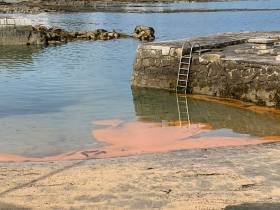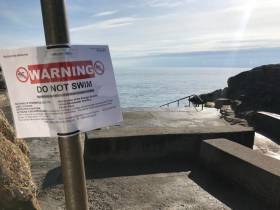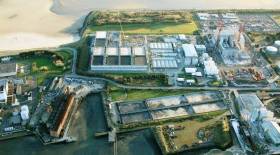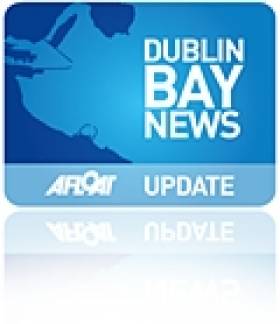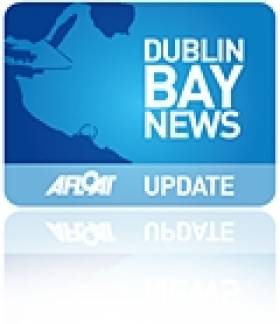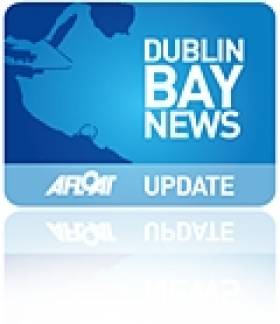Displaying items by tag: Ringsend
Updated: New Bathing Ban For Dublin Beaches After Heavy Rains Lead To Wastewater Overflow
Heavy rains in recent days have led to another wastewater overflow at the Ringsend treatment plant, as well as other pumping stations, that has prompted a new swimming ban at several Dublin Bay beaches.
It marks the second time this month that bathing has been prohibited at Dollymount Strand, Seapoint, Sandycove and the Forty Foot at Sandycove.
Both Dublin City and Dun Laoghaire-Rathdown councils say their bans will remain in place pending test for water quality, the first results of which are due on Thursday — in a week where Met Éireann forecasts higher temperatures.
While the bans do not affect Dun Laoghaire Harbour or other beaches in either council area, organisers of water-based sporting events have been advised to take note, as The Irish Times reports.
Notices will be put up on beaches today, Tuesday 25 June, according to RTÉ News.
Update 4.30pm: Dun Laoghaire-Rathdown County Council says tests on an ‘orange slick’ at Sandycove Beach confirm the presence of Noctiluca scintillans, a form of algae, and not raw sewage.
In a statement, the council said the non-toxic species is “a natural summer phenomenon in response to long day length, high nutrients and warm water” and is “not directly associated with the waste water overflows associated with the temporary bathing prohibition”.
Dublin local authorities have issued bathing ban notices for a number of popular swimming spots after a sewage leak at the Ringsend wastewater treatment plant, as RTÉ News reports.
Swimming is currently prohibited along the coast between Dollymount in North Dublin and White Rock Beach in Killiney on the Southside, just beyond Dublin Bay.
The string of bathing spots includes the enduringly popular Forty Foot in Sandycove.
Moreover, Sandymount and Merrion just south of Ringsend — where the wastewater plant was in the news earlier this year over a discharge in the Liffey — have been landed with a swimming ban for the entire 2019 bathing season due to their overall poor water quality.
RTÉ News has more on the story HERE.
EPA Investigates Wastewater Discharge In River Liffey
This past weekend’s discharge of wastewater in the River Liffey from the Irish Water treatment plant in Ringsend is being investigated by the Environmental Protection Agency.
As RTÉ News reports, failure of a processing tank at the locally controversial site led to the overflow, which Irish Water confirmed was from an outfall 1km from the plant in the Lower Liffey Estuary in Dublin Bay, around 9am on Saturday (23 February).
Irish Water says the discharge of ‘activated sludge’ — which “does not pose the same risk to public health or the environment as a raw sewage discharge would” — lasted for around 20 minutes.
But drone images captured on Saturday evening showed the persistence and extent of the pollution incident beside the Great South Wall.
The Ringsend wastewater treatment plant is reportedly running at 20% above capacity as it treats two-fifths of all wastewater in Ireland.
As such, its standard discharge “does not comply with the Urban Wastewater Treatment requirements”, according to an Irish Water statement which also confirmed that the EPA conducted an audit of the affected site yesterday (Tuesday 26 February).
Sailing Trawlers of Ringsend Lecture at Clontarf Yacht and Boat Club
Clontarf Yacht and Boat Club (CYBC) will host Cormac F. Lowth of the Irish Maritime Archaeological Society who will deliver a free illustrated historic boats lecture, ‘The Sailing Trawlers of Ringsend’ this Friday, October 30th at 8pm.
'Cormac’s talk is a fascinating story of the history of boating building in Ringsend which offers an insight into the life and times of the communities, the builders and the boats they constructed', says CYBC commodore Larry Meany.
There was a thriving industry along the Dodder in the early 1800s where many of the boatyards were based and Cormac has an incredible collection of unique and rare illustrations of the vessels as well as extensive lists of the names and crews of the boats.
'Cormac’s knowledge and interest in this era of history, the boats and people who built and sailed them is incredible. He is spent several years at sea on merchant ships and is the author of many historical and travel articles. Anyone interested in boating, building, or the industry and people in Dublin in the early 1800s will find this illustrated lecture interesting, informative and entertaining says Meany.
The illustrated lecture ‘The Sailing Trawlers of Ringsend’ by Cormac F. Lowth will take place in Clontarf Yacht and Boat Club, Belvedere, Clontarf Road on Friday 30th of October.
Supreme Court Clears Way For Ringsend Locals' Sewage Plant Challenge
#DublinBay - The Supreme Court has ruled that residents of Ringsend in Dublin can continue their legal challenge to the expansion of the area's sewage treatment plant, as RTÉ News reports.
The planned €270 million extension is part of the Dublin Bay Project that will see a 9km tunnel constructed to enable the discharge of treated sewage far into Dublin Bay.
At present the wastewater is discharged at Ringsend, in the southern part of Dublin's Docklands.
The Sandymount and Merrion Residents' Association argues that the new pipeline would discharge effluent into the newly designated marine conservation area between Rockabill and Dalkey Island.
The High Court's approval of residents' challenge to the granting of planning permission for the development was appealed by the State and Dublin City Council, but that appeal was rejected by the Surpreme Court today (10 October).
A similar sewage scheme in North Co Dublin has also faced objections from residents throughout the Fingal area.
RTÉ News has more on the story HERE.
Poolbeg Welcomes Back Dublin Bay Old Gaffers Winter Talks Programme
Please note that this inaugural talk of the season is on a Wednesday night which is a change from the normally scheduled Tuesday night, mostly starting at 8pm. Those wishing to attend may wish to arrive a bit earlier so to avail of the PYBC's clubhouse facilities, which overlooks its marina in the centre of Dublin Port, opposite Alexandra Basin.
The venue is located on the South Bank, Pigeon House Road, Ringsend which can be accessed from the Sean Moore Road that connects the Merrion Strand Road (from the south) and the East-Link Toll Bridge (from the north). For further information on the DBOGA lectures and more click HERE. In addition information about the PYBC Tel: (01) 668 9983 or logon to www.poolbegmarina.ie/
€220m for 9km Pipeline to Cut Dublin Bay Pollution
Dublin City Council is proposing a mammoth 9km sewage outfall pipe to help make Dublin Bay cleaner - at a cost of €220m.
Herald.ie reports that the 5m-wide pipe - longer than the Dublin Port Tunnel - would dump effluent from the Ringsend treatment plant far offshore, thereby avoiding pollution in the bay and sensitive areas such as Bull Island, which recently lost its EU Blue Flag status for Dollymount Strand.
Plans for the project, which DCC head of waste Pat Cronin described as the "greenest and most economic solution" will be open to public consultation in the near future, with a timetable for completion by 2015.
The pipeline and redeveloped treatment plant will be funded via the Department of the Environment's water services investment programme.
Lord Mayor to Preside over Old Gaffers' Parade of Sail
Dublin's Lord Mayor Gerry Breen will assume the traditional title of Admiral of the Port of Dublin when he presides over the Parade of Sail on the Liffey later this month.
The parade on Sunday 29 May is a highlight of the annual Dublin Bay Old Gaffers Association rally, which this year is held in tandem with the Stella Maris Rowing Club regatta.
Rowing clubs along the east coast will be sending crews to Dublin to compete for the special Asgard Trophy, which is made of timber used in the conservation of the original Asgard in the National Museum.
The event - centred at the Poolbeg Yacht and Boat Club near Ringsend - is also expected to attract classic vessels from ports in Wales and Northern Ireland.
For more information contact the Dublin Bay Old Gaffers Association at www.dublinbayoldgaffersassociation.com or [email protected]
The Old Gaffers Association is a sailing organisation dedicated to preserving traditional sailing craft, usually former working boats, and mainly of wooden construction, promoting their distinctive gaff rig.
Lecture: “The Circumnavigation – Continued”
For further information on the lectures to date click this link and in general about the DBOGA logon here. To contact the PYBC Tel: (01) 668 9983 or logon to www.poolbegmarina.ie/
The Dublin Bay Old Gaffers Association (DBOG) Winter /Spring lecture programme continues in the Poolbeg Yacht Boat Club & Marina (PYBC). with the next lecture: "The Installation, Operation and Maintenance of Marine Diesels". The lecture will be held on Tuesday, February 8th and the presenter is Sean Walsh (Yanmar Agent).
For further information on the DBOG lectures please contact Tim Magennis on 087 2593113. For information in general about the PYBC Tel: (01) 668 9983 or logon to www.poolbegmarina.ie/



























